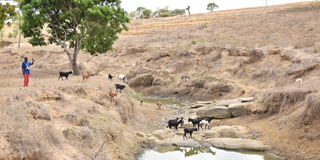Kenya Red cross to buy livestock in drought-hit Kwale

A herder walks with his livestock in search of water and pasture in Mavirivirini area of Kinango, Kwale. Kenya Red Cross has announced plans to buy livestock in drought-stricken county.
The Kenya Red Cross has announced plans to buy livestock in drought-stricken Kwale County.
Many livestock farmers are alarmed that their frail and sickly cattle and goats continue to die in greater numbers.
The agency will buy animals from at least 500 livestock keepers while 1,000 families will get emergency cash in Matuga, Lungalunga and Kinango sub-counties.
Other areas targeted are Chengoni/Samburu, Mackinnon Road, Puma, Kasemeni, Ndavaya, Mwereni and Mbunguni wards, which do not have access to piped water.
The two initiatives will help families who have been adversely affected by drought, said Kwale Kenya Red Cross Coordinator Mohammed Mwaenzi.
A cow will fetch between Sh5,000 and Sh6,000, while in the cash transfer programme, households will receive Sh5,400 for two months, he said.
The animals the agency buys will then be slaughtered and distributed to residents.
Widowed mothers and orphaned households will be prioritised.
“Since the programme cannot serve all the residents in affected areas, we are only targeting high-risk populations so that it can be effective,” he said.
The initiative is championed by the national government through the National Drought Management Authority (NDMA), the county government and international organisations such as the Food Agriculture Organization (FAO).
The county’s department of agriculture, livestock, and fisheries had dispatched veterinary officers to work with the humanitarian organisations to assess the health and conditions of the animals before they are bought, Mr Mwaenzi noted.
Kwale is among16 counties hit hard by drought.
The long rains that farmers were expecting after preparing their farms have failed, leading to food shortages. Ninety per cent of water pans have also dried, along with seasonal rivers, leaving residents with no sources of clean water.
Earlier this month the national government and the county began distributing relief food to Kinango residents.




